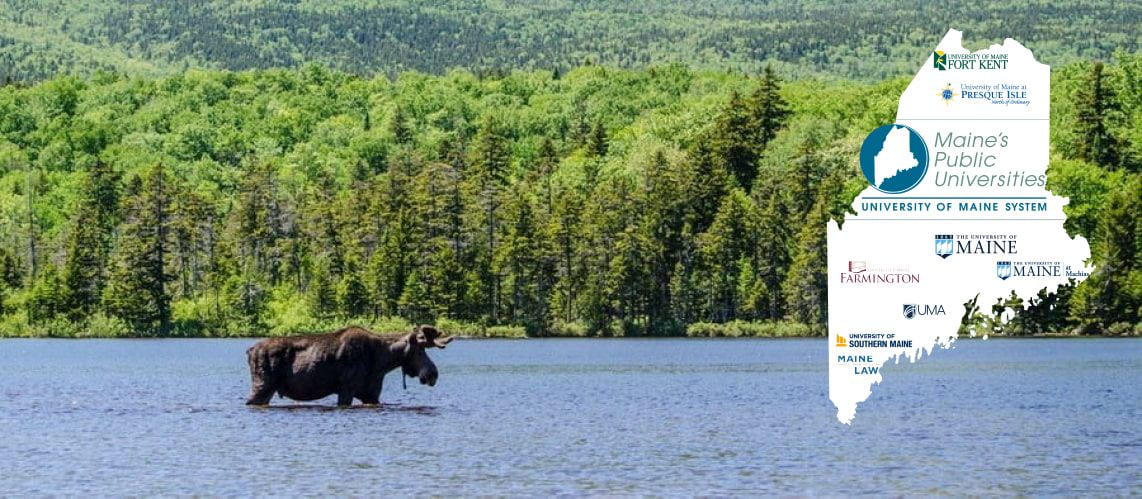
BOX TO ONEDRIVE MIGRATION | ERP ASSESSMENT | EAB NAVIGATE | MYCAMPUS UPGRADE
BOX TO ONEDRIVE MIGRATION
In 2019 the University of Maine System convened a Cloud Storage Task Force to review services for cloud-based storage, data management, and document collaboration. Multiple cloud storage offerings are currently  available (Box, Google Drive, OneDrive), and in an effort to identify opportunities for efficiency, cost management, and improved user experience, an analysis was performed by this cross-functional team and recommendations were made on a cloud storage strategy that will best serve the overall needs of the UMS community. For details on the Task Force’s efforts and recommendations, please refer to the Task Force Summary and Recommendations.
available (Box, Google Drive, OneDrive), and in an effort to identify opportunities for efficiency, cost management, and improved user experience, an analysis was performed by this cross-functional team and recommendations were made on a cloud storage strategy that will best serve the overall needs of the UMS community. For details on the Task Force’s efforts and recommendations, please refer to the Task Force Summary and Recommendations.
Our current cloud storage solution contract with Box will end in February 2021, and the Task Force has recommended not to renew the contract. All content from Box will be migrated to our newest cloud storage services, OneDrive for work and school and SharePoint.
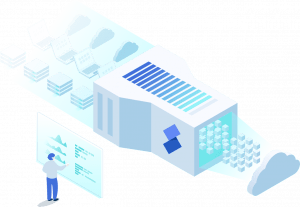 The Cloud Storage Migration project team formed in June 2020 and is responsible for migrating all files and folder structures from Box. The migration process will be a “continuous migration,” where files and folders in Box are regularly copied and migrated to OneDrive and SharePoint. This work is being performed behind the scenes to ensure minimal impact to Box users. The migration process is currently underway and will run through the beginning of February, with a cutover to OneDrive and SharePoint to occur sometime around mid-January.
The Cloud Storage Migration project team formed in June 2020 and is responsible for migrating all files and folder structures from Box. The migration process will be a “continuous migration,” where files and folders in Box are regularly copied and migrated to OneDrive and SharePoint. This work is being performed behind the scenes to ensure minimal impact to Box users. The migration process is currently underway and will run through the beginning of February, with a cutover to OneDrive and SharePoint to occur sometime around mid-January.
ERP ASSESSMENT

In August 2020, US:IT, in partnership with Huron Consulting Services, launched a project to evaluate the University of Maine System’s (UMS) MaineStreet applications. This initiative includes assessments of PeopleSoft Student, HR, Financials, and related applications. The desired outcomes for the initiative are:
- Evaluation of the current state of the shared ERP PeopleSoft (MaineStreet) environment
- Identification of deficiencies created by the current platform configuration, business processes, and underlying data architecture
- Summary of functionality required for a unified, future-state ERP environment fully supporting the strategic priorities of the UMS, including Unified Accreditation and Collaborative Degree Programs.
- Identification of efficiencies that may be attained through technological improvements or innovations including leveraging cloud-native solutions when feasible and realistic
- Evaluation of opportunities for improvements within the current ERP platform to deliver future-state functionality and support current and emerging business needs, including a shared, unified course catalog.
- A recommended plan to achieve UMS strategic outcomes through the realignment of technological tools, processes, and policies
The initial phase of the project involved engaging stakeholders from universities across the UMS through questionnaires and collaborative virtual workshops to gather information about current business processes. The current state assessment focused on identifying existing challenges, distinct needs, and supporting technologies.
The observations and findings will be used to formulate Huron’s Roadmap report that will provide actionable recommendations that are prioritized and aligned to UMS strategic goals. The roadmap will outline the scope and sequencing of the improvements to MaineStreet and will inform the optimal future state for the UMS. Huron’s final deliverable will be its final report that will be a high-level summary of all the information Huron collected during the assessment and of its findings.
EAB NAVIGATE
The University of Maine System has expanded its use of EAB’s Navigate Student Success tools. These tools facilitate connections between students, advisors, faculty, staff, and campus events and became even more critical when campuses transitioned to remote learning.
EAB Navigate was first implemented in 2018 at the University of Maine at Augusta, the University of Maine at Presque Isle, and the University of Maine at Machias. The University of Maine went live with Navigate in 2019. As of Fall 2020, Navigate is being used on all University of Maine System campuses.
Features of EAB Navigate include:
- Student mobile app and website
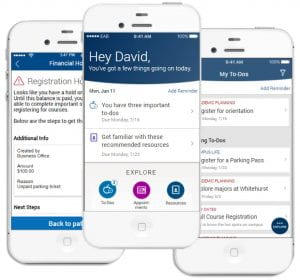
- Communication of To Do’s, Events, and Alerts
- View of Student Schedules
- Connections to other students through Study Buddies
- Ability to schedule time with advisors, faculty, and student support services
- Staff website
- Ability to post available time to meet with students
- Ability to search and group students and communicate with groups of students
- Academic alerts and early warnings
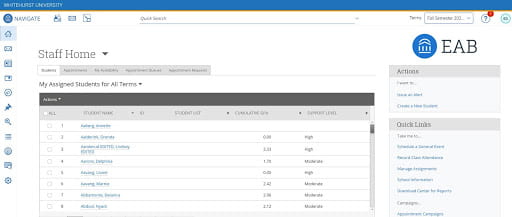
Implementation Updates 2020
Both the University of Maine at Farmington and the University of Maine at Fort Kent fully implemented the student and staff applications in Fall 2020 and are working to expand their use among students and faculty. The University of Southern Maine introduced the student app with limited functionality in October and will implement the staff website and expanded features over the Spring 2021 Semester.
The University of Maine at Machias campus has piloted student communication through text messaging and it is expected that this will be available to other campuses during the Spring 2021 Semester.
Student Success teams on each campus will continue to actively work with EAB’s Strategic Leader to set goals, maximize use of the tools, and monitor progress as appropriate to each campus.
MYCAMPUS UPGRADE
myCampus is the internal web portal and primary gateway to essential online resources which students, staff, and faculty utilize on a daily basis. In addition to providing campus specific content and context, the portal effectively addresses the growing challenge of managing access to authenticated online resources through the UMS Single-Sign-On system.
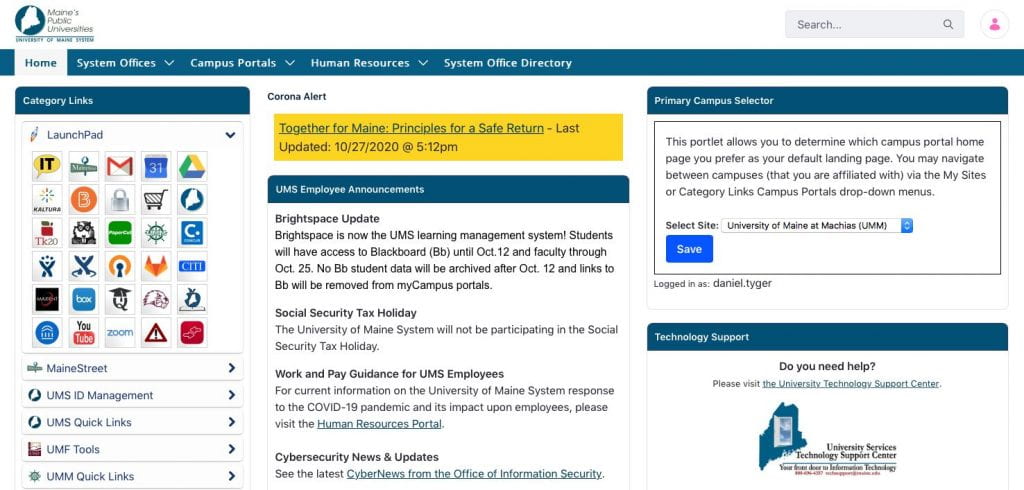
Once logged into the system, the Single-Sign-On solution provides easy access to systems such as Brightspace, GMail, and MaineStreet, along with campus-specific applications, without the need to log-in separately to each system.
A significant portal upgrade was completed in August 2020 with improved mobile design, enhanced search functionality, and better organization of content. However, the major upgrade focused on the underlying infrastructure and architecture in support of the strategic needs of the University.
The increasing value of the portal is demonstrated by a 29.3% increase in user sessions and a 37.5% increase in time spent per page when comparing August through October, 2020 to the same period in 2019.
